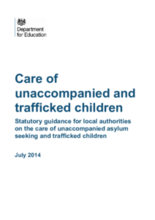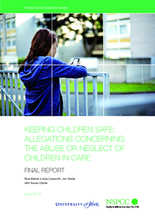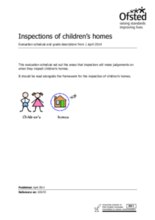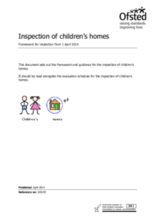

Displaying 1481 - 1490 of 1649
This article from the UK's Independent explores the findings of a recent study conducted by York University and the NSPCC which finds that "on average there are between 450 and 550 cases of proven abuse every year in foster care and between 250 and 300 cases of confirmed abuse a year in residential care" in Britain.
This guidance sets out the steps local authorities should take to plan for the provision of support for looked after children who are unaccompanied asylum seeking children and child victims of trafficking.
This study, from the National Society for the Prevention of Cruelty to Children (NSPCC) in the UK, focuses on those children in alternative care who experience abuse or neglect at the hands of their caretakers or guardians who are responsible for ensuring their wellbeing.
The presentation from Innocenti’s Expert Consultation on Family and Parenting Support focuses on the need for parenting interventions for preventing teenage sexual violence.
This article highlights the impact three recent television documentaries on British television have had on public awareness and understanding of foster care and adoption processes.
This article highlights the impact of three recent television documentaries on British television have had on public awareness and understanding of foster care and adoption processes.
This article highlights the impact three recent television documentaries on British television have had on public awareness and understanding of foster care and adoption processes.
This article provides an overview of the current situation in the out-of-home care in Norway and Sweden. Development in later years is described and discussed, including the trends towards privatization of the welfare system in both countries and the role of private, commercial actors within the care sector including out-of-home care for children and young people.
This evaluation schedule set out the areas that inspectors will make judgements on when they inspect children’s homes in the UK. It should be read alongside the framework for the inspection of children’s homes.
This document sets out the framework and guidance for the inspection of children’s homes in the UK. It should be read alongside the evaluation schedule for the inspection of children’s homes.




